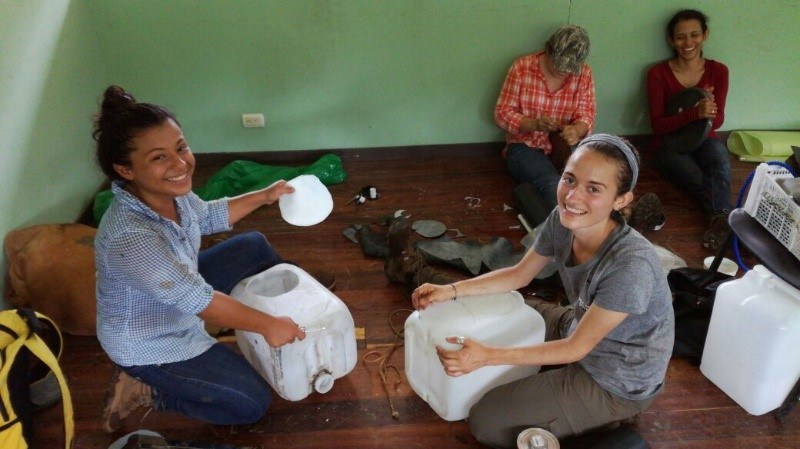Posted: February 8, 2018
By Haley Stauffer Major in BioRenewable Systems, Minors in International Agriculture and Spanish. "There are few things I cannot resist in my life and the country and people of Costa Rica is at the top of the list."

Cutting out pieces from plastic bins and tires with other students to insure the valves on the biodigestor are air-tight.
There are few things I cannot resist in my life and the country and people of Costa Rica is at the top of the list. Wanting to pursue my third trip to Costa Rica this past summer to study, I was able to secure an international internship at the world-renowned EARTH University, located in Guacimo near the Pacific coast. Arranging to stay for six weeks and take a Spanish class at the University, I now wish I had stayed for the duration of the summer. The connections and life lessons I learned through this experience have proved truly life changing and cannot be summarized in one statement.
Arriving at EARTH on May 14th, I settled into my dorm room and met my doña, or roommate, Eva from Mozambique. Eva is one of the many students I was fortunate to have met from various countries studying in Costa Rica. EARTH University is a highly prestigious agricultural research university and has 400 students from over 40 different countries represented. My best friend from the university was a third-year student, Karen, from Guatemala, and she introduced me to other students from Ecuador, Paraguay, Bolivia, Argentina, Malawi, Kenya, Somalia, El Salvador, Sweden, amongst others. We would always have our meals together outside of the cafeteria under the palm trees and they would show me popular spots around campus, like the botanical gardens and "la posa", or the spot by the river accustomed with a rope swing. I even managed to travel for a weekend with Karen and another student from Ecuador to Jacó which was a beach on the Caribbean coast. I am incredibly thankful that I was able to meet students my age from various countries during my internship and I still talk to a majority of them today.
For my internship, I worked with my supervisor, Arnoldo Avila to manage and learn about multiple aspects of organic farming, such as compost management, animal care, and vegetable farming. Life cycle analysis was the main point of focus during my time at EARTH University and I was able to see how the Cacao trees on the farm were hand fertilized with a juice mixture filtered by the black fly larvae and consisting of water and broken up cacao shells. Furthermore, the black fly larvae were then fed to the chickens as protein to help save on feed costs. In addition, the compost station on the farm composed of ten beds that were constantly cycled and consisted of a lasagna-like structure of carbon from the leaves and nitrogen from the animal waste (preferred cow discharge as it was more digested) that was either combined with microorganisms from the forest, yeast, and molasses to create a slurry mixture, or it was used directly in the vegetable fields on the plants.
The layout of the Integrated Organic Farm at EARTH University also served a purpose as the chickens were on a specific rotation to encourage their natural grazing of the land for planting. In continuance, the vegetable garden was in a rotunda with a pool in the middle. This design eliminated the need for a tractor to constantly go up and down rows as they could manage the land in one continuous cycle, and it further encouraged the use of aquaponics as the tilapia they were growing would hopefully be placed there.
One of my favorite projects conducted on the farm was the dry biodigestor located at the pig pen. I helped with the total construction, from start to finish, and learned a great deal about the operations and overall objectives of a biodigestor on a farm.
A biodigestor consists of a large plastic "bubble" that is created that holds animal waste in an anaerobic state to encourage the breakdown of the waste and release of methane gas. The gas that is produced will be used to fire a stove for cooking, and the resulting effluent from the water and waste mixture that filters out of the plastic bag will be used as fertilizer for the plants. This concept was completely new to me and I was extremely excited and privileged to have been a key component to the construction of what was known as 'Elvis' on the farm.
Ag Sciences Global
Address
106 Agricultural Administration BuildingUniversity Park, PA 16802
- Email globalag@psu.edu
- Office 814-863-0249
- Fax 814-865-3055
Ag Sciences Global
Address
106 Agricultural Administration BuildingUniversity Park, PA 16802
- Email globalag@psu.edu
- Office 814-863-0249
- Fax 814-865-3055

